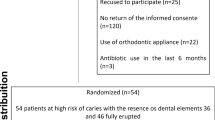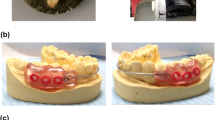Abstract
The aim of the present study was to evaluate, in vitro, the effect of different pre-irradiation times of the photosensitizer in photodynamic therapy in biofilms formed by Streptococcus mutans and Candida albicans, through the evaluation of the microbial load. The factors under study were as follows: times of pre-irradiation of the photosensitizer in three levels (1, 2, or 5 min). For the control of the cariogenic dental biofilm with antimicrobial photodynamic therapy (aPDT), methylene blue (0.01%) was used in association with the diode laser (InGaAlP) with a wavelength of 660 nm. Chlorhexidine digluconate (0.12% CHX) and saline were used as positive and negative controls, respectively. The study design was carried out in complete and randomized blocks. The sample consisted of 15 S. mutans biofilms cultures, randomly divided into five groups and 15 C. albicans cultures, also divided into five groups. The experiment was performed in triplicate (n = 3) and the response variables were obtained through quantitative analysis of bacterial viability, expressed in colony-forming units (CFU) per square millimeter of the specimen area. The data were analyzed with the aid of the ANOVA one-way test and Tukey’s post-test. All analyses were performed using the Graph Pad Prism 4.0 program, with a significance level of 5%. For the S. mutans group, only the saline solution presented a statistically significant difference when compared to the other treatments (p < 0.05), that is, the treatment with aPDT, irrespective of the irradiation time applied, was similar to the treatment with CHX and both were more effective in reducing cariogenic biofilm compared to saline. For the group of C. albicans, there was no statistical difference between the groups (p > 0.05). Therefore, it can be concluded that the treatment with aPDT reduced the number of CFUs of S. mutans in a similar way to CHX, independently of the pre-irradiation time applied. No effect of this therapy or of the different pre-irradiation times on the C. albicans biofilm could be observed. In this way, the pre-irradiation time of 1 min can be used to reduce the microbial load of S. mutans.




Similar content being viewed by others
References
Iwano Y, Sugano N, Matsumoto K, Nishihara R, Iizuka T, Yoshinuma N et al (2010) Salivary microbial levels in relation to periodontal status and caries development. J Periodontal Res 45(2):165–169
Nelson-Filho P, Olmedo LY, Andrucioli MC, Saraiva Mda C, Matsumoto MA, de Queiroz AM et al (2011) Use of the checkerboard DNA-DNA hybridisation technique for in vivo detection of cariogenic microorganisms on metallic brackets, with or without use of an antimicrobial agent. J Dent 39(7):513–517
Saravia ME, Nelson-Filho P, Silva RA, De Rossi A, Faria G, Silva LA et al (2013) Recovery of mutans streptococci on MSB, SB-20 and SB-20M agar media. Arch Oral Biol 58(3):311–316
Metwalli KH, Khan SA, Krom BP, Jabra-Rizk MA (2013) Streptococcus mutans, Candida albicans, and the human mouth: a sticky situation. PLoS Pathog 9(10):e1003616
Falsetta ML, Klein MI, Colonne PM, Scott-Anne K, Gregoire S, Pai CH et al (2014) Symbiotic relationship between Streptococcus mutans and Candida albicans synergizes virulence of plaque biofilms in vivo. Infect Immun 82(5):1968–1981
Stenderup A (1990) Oral mycology. Acta Odontol Scand 48(1):3–10
Samaranayake LP, MacFarlane TW (1981) A retrospective study of patients with recurrent chronic atrophic candidosis. Oral Surg Oral Med Oral Pathol 52(2):150–153
Farah CS, Ashman RB, Challacombe SJ (2000) Oral candidosis. Clin Dermatol 18(5):553–562
Allen CM (1994) Animal models of oral candidiasis. A review. Oral Surg Oral Med Oral Pathol 78(2):216–221
Ciancio SG (1989) Adjunctive uses of topical antimicrobial mouthrinses. Am J Dent 2:299–302
Addy M, Wade W, Goodfield S (1991) Staining and antimicrobial properties in vitro of some chlorhexidine formulations. Clin Prev Dent 13(1):13–17
Soukos NS, Goodson JM (2011) Photodynamic therapy in the control of oral biofilms. Periodontol 55(1):143–166
Zanin IC, Goncalves RB, Junior AB, Hope CK, Pratten J (2005) Susceptibility of Streptococcus mutans biofilms to photodynamic therapy: an in vitro study. J Antimicrob Chemother 56(2):324–330
Zanin IC, Lobo MM, Rodrigues LK, Pimenta LA, Hofling JF, Goncalves RB (2006) Photosensitization of in vitro biofilms by toluidine blue O combined with a light-emitting diode. Eur J Oral Sci 114(1):64–69
Wood S, Metcalf D, Devine D, Robinson C (2006) Erythrosine is a potential photosensitizer for the photodynamic therapy of oral plaque biofilms. J Antimicrob Chemother 57(4):680–684
Basso FG, Oliveira CF, Fontana A, Kurachi C, Bagnato VS, Spolidorio DM et al (2011) In vitro effect of low-level laser therapy on typical oral microbial biofilms. Braz Dent J 22(6):502–510
Mang TS, Tayal DP, Baier R (2012) Photodynamic therapy as an alternative treatment for disinfection of bacteria in oral biofilms. Lasers Surg Med 44(7):588–596
Wilson M, Burns T, Pratten J, Pearson GJ (1995) Bacteria in supragingival plaque samples can be killed by low-power laser light in the presence of a photosensitizer. J Appl Bacteriol 78(5):569–574
Wood S, Nattress B, Kirkham J, Shore R, Brookes S, Griffiths J et al (1999) An in vitro study of the use of photodynamic therapy for the treatment of natural oral plaque biofilms formed in vivo. J Photochem Photobiol B 50(1):1–7
Lima JP, Sampaio de Melo MA, Borges FM, Teixeira AH, Steiner-Oliveira C, Nobre Dos Santos M et al (2009) Evaluation of the antimicrobial effect of photodynamic antimicrobial therapy in an in situ model of dentine caries. Eur J Oral Sci 117(5):568–574
Guglielmi Cde A, Simionato MR, Ramalho KM, Imparato JC, Pinheiro SL, Luz MA (2011) Clinical use of photodynamic antimicrobial chemotherapy for the treatment of deep carious lesions. J Biomed Opt 16(8):088003
O’Neill JF, Hope CK, Wilson M (2002) Oral bacteria in multi-species biofilms can be killed by red light in the presence of toluidine blue. Lasers Surg Med 31(2):86–90
Muller P, Guggenheim B, Schmidlin PR (2007) Efficacy of gasiform ozone and photodynamic therapy on a multispecies oral biofilm in vitro. Eur J Oral Sci 115(1):77–80
Pereira CA, Romeiro RL, Costa AC, Machado AK, Junqueira JC, Jorge AO (2011) Susceptibility of Candida albicans, Staphylococcus aureus, and Streptococcus mutans biofilms to photodynamic inactivation: an in vitro study. Lasers Med Sci 26(3):341–348
Araujo NC, Fontana CR, Bagnato VS, Gerbi ME (2014) Photodynamic antimicrobial therapy of curcumin in biofilms and carious dentine. Lasers Med Sci 29(2):629–635
Melo MA, Rolim JP, Passos VF, Lima RA, Zanin IC, Codes BM et al (2015) Photodynamic antimicrobial chemotherapy and ultraconservative caries removal linked for management of deep caries lesions. Photodiagn Photodyn Ther 12(4):581–586
Coimbra FC, Salles MM, De Oliveira VC, Macedo AP, Da Silva CH, Pagnano VO et al (2016) Antimicrobial efficacy of complete denture cleansers. Am J Dent 29(3):149–153
Marsh PD (2010) Microbiology of dental plaque biofilms and their role in oral health and caries. Dent Clin N Am 54(3):441–454
Sousa AS, Prates RA, de Santi ME, Lopes RG, Bussadori SK, Ferreira LR et al (2016) Photodynamic inactivation of Candida albicans biofilm: influence of the radiant energy and photosensitizer charge. Photodiagn Photodyn Ther 14:111–114
Costerton JW, Stewart PS, Greenberg EP (1999) Bacterial biofilms: a common cause of persistent infections. Science 284(5418):1318–1322
Williams JA, Pearson GJ, Colles MJ, Wilson M (2003) The effect of variable energy input from a novel light source on the photoactivated bactericidal action of toluidine blue O on Streptococcus mutans. Caries Res 37(3):190–193
Costa AC, Chibebe Junior J, Pereira CA, Machado AK, Beltrame Junior M, Junqueira JC et al (2010) Susceptibility of planktonic cultures of Streptococcus mutans to photodynamic therapy with a light-emitting diode. Braz Oral Res 24(4):413–418
Dovigo LN, Pavarina AC, Carmello JC, Machado AL, Brunetti IL, Bagnato VS (2011) Susceptibility of clinical isolates of Candida to photodynamic effects of curcumin. Lasers Surg Med 43(9):927–934
Dovigo LN, Pavarina AC, Mima EG, Giampaolo ET, Vergani CE, Bagnato VS (2011) Fungicidal effect of photodynamic therapy against fluconazole-resistant Candida albicans and Candida glabrata. Mycoses 54(2):123–130
Quishida CC, Carmello JC, Mima EG, Bagnato VS, Machado AL, Pavarina AC (2015) Susceptibility of multispecies biofilm to photodynamic therapy using photodithazine(R). Lasers Med Sci 30(2):685–694
Ramage G, Vandewalle K, Wickes BL, Lopez-Ribot JL (2001) Characteristics of biofilm formation by Candida albicans. Rev Iberoam Micol 18(4):163–170
Varoni E, Tarce M, Lodi G, Carrassi A (2012) Chlorhexidine (CHX) in dentistry: state of the art. Minerva Stomatol 61(9):399–419
de Sousa Farias SS, Nemezio MA, Corona SA, Aires CP, Borsatto MC (2016) Effects of low-level laser therapy combined with toluidine blue on polysaccharides and biofilm of Streptococcus mutans. Lasers Med Sci 31(5):1011–1016
Ccahuana-Vasquez RA, Cury JA (2010) S. mutans biofilm model to evaluate antimicrobial substances and enamel demineralization. Braz Oral Res 24(2):135–141
Wilson M, Burns T, Pratten J (1996) Killing of Streptococcus sanguis in biofilms using a light-activated antimicrobial agent. J Antimicrob Chemother 37(2):377–381
Schneider M, Kirfel G, Berthold M, Frentzen M, Krause F, Braun A (2012) The impact of antimicrobial photodynamic therapy in an artificial biofilm model. Lasers Med Sci 27(3):615–620
Ricatto LG, Conrado LA, Turssi CP, Franca FM, Basting RT, Amaral FL (2014) Comparative evaluation of photodynamic therapy using LASER or light emitting diode on cariogenic bacteria: an in vitro study. Eur J Dent 8(4):509–514
Wainwright M (2005) The development of phenothiazinium photosensitisers. Photodiagn Photodyn Ther 2(4):263–272
Usacheva MN, Teichert MC, Biel MA (2003) The interaction of lipopolysaccharides with phenothiazine dyes. Lasers Surg Med 33(5):311–319
Author information
Authors and Affiliations
Corresponding author
Ethics declarations
Ethical standards
The manuscript does not contain clinical studies or patient data.
Ethical approval
This article does not contain any studies with human participants or animals performed by any of the authors.
Conflict of interest
The authors declare that they have no conflict of interest.
Rights and permissions
About this article
Cite this article
Fumes, A.C., Romualdo, P.C., Monteiro, R.M. et al. Influence of pre-irradiation time employed in antimicrobial photodynamic therapy with diode laser. Lasers Med Sci 33, 67–73 (2018). https://doi.org/10.1007/s10103-017-2336-1
Received:
Accepted:
Published:
Issue Date:
DOI: https://doi.org/10.1007/s10103-017-2336-1




